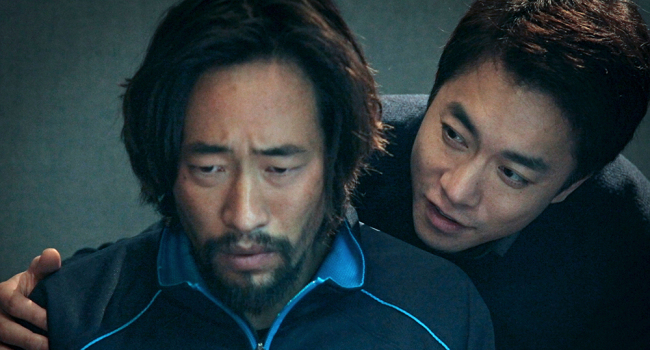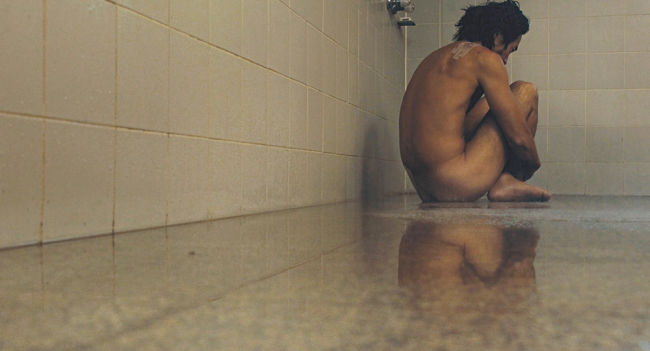Small fish caught in ‘The Net’ of big ideologies
Kim Ki-duk’s new film tells surprisingly neat tale of how blind pursuit of ideology can quash individual lives
By Rumy DooPublished : Sept. 29, 2016 - 17:01
Controversial director Kim Ki-duk has veered away from the provocative in his latest psychological drama “The Net,” which centers on a North Korean fisherman who accidentally drifts into South Korean waters. Verbose, calculated and bordering on didactic, the film, which premiered at the Venice International Film Festival last month, might be described as the prolific and brazen director’s most wholesome, public-friendly work to date. While relatively low on shock factor, coming from Kim, it does provide compelling insights into Korea’s division and how different generations of South Koreans view it 66 years after the outbreak of the Korean War.
Nam Chul-woo (Ryoo Seung-beom) is a humble fisherman living in a small but homey shack near the Imjin River that borders South Korea with his docile wife and young daughter. Each day Nam ventures out into the precarious waters to catch a handful of small fish to sustain his family. One day, his net is caught in the engine and his crumbling fishing boat is carried by the tides toward South Korean waters. North Korean soldiers spot him from afar, unable to distinguish whether Nam is defecting or in distress.
Nam is taken in for questioning when South Korea’s National Intelligence Service discovers him washed ashore on a beach. The interrogating officer in charge of his case (Kim Young-min) is adamant in proving, through torture if necessary, that Nam is a spy. Oh Jin-woo (Lee Won-geun), Nam’s minder, is more sympathetic. He believes the fisherman’s sincerity and vouches for him, urging South Korean officials to let Nam return to his home and reunite with his family.
With insufficient evidence to prove Nam is indeed a spy, the NIS decides to persuade him to defect, taking him to Myeong-dong, Seoul’s bustling, tourist-filled downtown, to woo him with the luster of capitalism. Nam refuses to give in, keeping his eyes shut and only reluctantly opening them when forced to do so. After discovering the endless rows of towering buildings and products and a short encounter with a struggling female prostitute, all preconceptions about life changes for the simple fisherman.
Nam Chul-woo (Ryoo Seung-beom) is a humble fisherman living in a small but homey shack near the Imjin River that borders South Korea with his docile wife and young daughter. Each day Nam ventures out into the precarious waters to catch a handful of small fish to sustain his family. One day, his net is caught in the engine and his crumbling fishing boat is carried by the tides toward South Korean waters. North Korean soldiers spot him from afar, unable to distinguish whether Nam is defecting or in distress.
Nam is taken in for questioning when South Korea’s National Intelligence Service discovers him washed ashore on a beach. The interrogating officer in charge of his case (Kim Young-min) is adamant in proving, through torture if necessary, that Nam is a spy. Oh Jin-woo (Lee Won-geun), Nam’s minder, is more sympathetic. He believes the fisherman’s sincerity and vouches for him, urging South Korean officials to let Nam return to his home and reunite with his family.
With insufficient evidence to prove Nam is indeed a spy, the NIS decides to persuade him to defect, taking him to Myeong-dong, Seoul’s bustling, tourist-filled downtown, to woo him with the luster of capitalism. Nam refuses to give in, keeping his eyes shut and only reluctantly opening them when forced to do so. After discovering the endless rows of towering buildings and products and a short encounter with a struggling female prostitute, all preconceptions about life changes for the simple fisherman.

Ultimately, it is clear that Nam is a small fish caught in the net of big ideologies that are presented as equally dogmatic and annihilating of the individual. A physically battered and psychologically shaken Nam is sent back to North Korea, where he no longer fits into the simplicity of his hand-to-mouth life. And his home country is short of welcoming, authorities there trusting his story no more than their southern counterparts.
The film offers three characters who are each representative of a specific generation’s view on inter-Korean matters. The senior NIS official acts on patriotism and duty, firmly believing in liberating Nam from the vile authoritarian regime; the mid-level interrogator pursues his own frenzied agenda to punish all communists, who he believes are criminals by default; and youngest official Oh is swayed by the fisherman’s desire to return to his family, connecting with him on a human level.
The 55-year-old director served in the South Korean Navy in his youth, during which he was trained to be full of “antipathy” toward the repressive nation across the border. After his discharge, however, Kim had realized that “individual rage cannot solve inter-Korean problems,” he said.
“Korea seems to be the battleground for global powers. I wanted us to look back on our problem from our own perspective.”
Kim has probed a wide range of human conditions in his past work: He showed profound contemplation against a stunning backdrop in “Spring, Summer, Fall, Winter ... and Spring” (2003) and a similar wistfulness in “The Bow” (2015); raging loneliness and brutality in “Address Unknown” (2001); and the savage depths to which motherhood can sink in “Pieta” (2012), which won the Golden Lion in Venice.

For those seeking Kim’s blunt observation of the violence and paradox that pervade the gritty, often unpalatable lives of the marginalized, this film may feel tame and intellectual, each line a political message. But Kim felt the issue of national defense was a profound one that needed to be addressed.
“It’s not a question of one individual, it’s a question of our future,” he said. “In any case, I believe that the world we live in has to be stable in order for filmmakers to make films.
“It’s not a film I made just for this generation, but also for the next generation, which will be responsible for whether Korea will be able to reunite. ... As the years go by, we seem to be growing increasingly tangled in arguments rather than getting close to finding a solution.”
Kim previously participated in producing and writing films such as “Poongsan” (2011) and “Red Family” (2013), which also center on South-North ideological tensions affecting families.
“The Net” opens in local theaters Thursday.
By Rumy Doo (doo@heraldcorp.com)







![[KH Explains] How should Korea adjust its trade defenses against Chinese EVs?](http://res.heraldm.com/phpwas/restmb_idxmake.php?idx=644&simg=/content/image/2024/04/15/20240415050562_0.jpg&u=20240415144419)










![[Today’s K-pop] Stray Kids to return soon: report](http://res.heraldm.com/phpwas/restmb_idxmake.php?idx=642&simg=/content/image/2024/04/16/20240416050713_0.jpg&u=)